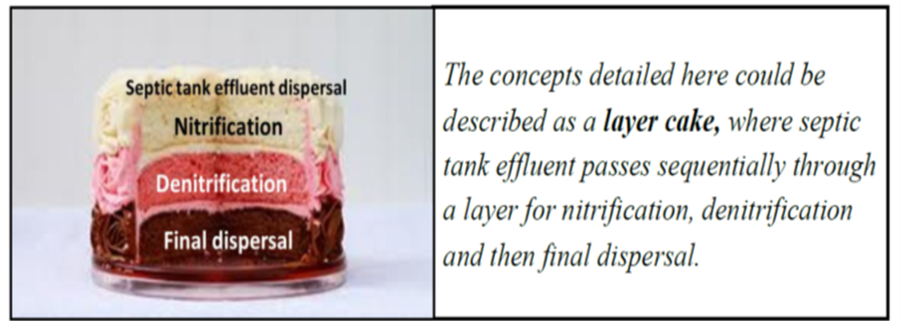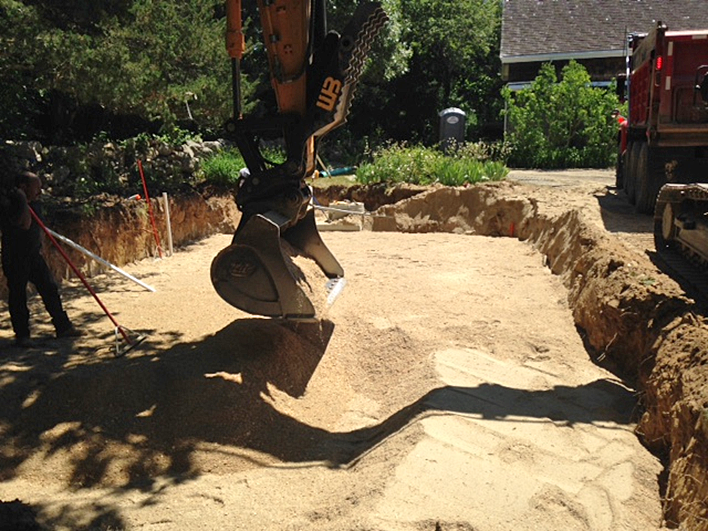Pilot project will test new septic system design to address Bay’s biggest source of nitrogen pollution
Septic systems are the biggest source of nitrogen pollution in Buzzards Bay. The technology exists to upgrade septic systems to reduce nitrogen – but it can be complex and costly. Working together with partners from Cape Cod and Rhode Island as part of a new grant, the Coalition is supporting a pilot project to test new technology that could help reduce harmful nitrogen pollution from septic systems.
Approximately 70% of the Bay’s nitrogen pollution comes from traditional septic systems, called Title 5 systems. These systems aren’t designed to remove nitrogen, so it seeps into groundwater and becomes pollution in our harbors, coves, and rivers.
The Coalition has been working with towns and homeowners across the Buzzards Bay region to install nitrogen-reducing septic systems. In West Falmouth, 20 homeowners recently upgraded their septic systems and cesspools to nitrogen-reducing technology as part of a grant-funded project led by the town of Falmouth and the Coalition. These new systems are already being shown to reduce an average of 88% of nitrogen.
Now we’re trying something new. With a $730,000 grant from the EPA’s Southeast New England Coastal Watershed Restoration Program, the Coalition is partnering with the Barnstable County Department of Health and Environment, water engineering firm Hazen and Sawyer, and the University of Rhode Island to install 12 septic systems called “layer cakes” at homes in seven towns around Buzzards Bay.

The “layer cake” septic system removes nitrogen from wastewater by passing it through several layers in the leach field.
The “layer cake” gets its name from a multi-layer leach field that’s designed to remove nitrogen from wastewater. Layer cake septic systems were first tested in Florida, where researchers found that these systems could remove up to 85% of nitrogen in wastewater. The Barnstable County Department of Health and Environment’s Massachusetts Alternative Septic System Test Center is also testing a layer cake design, and has found it promising for homes on Cape Cod and around Buzzards Bay.

One layer cake system has already been installed this year at a home in West Falmouth as part of the Coalition’s project with the town of Falmouth to upgrade 20 septic systems along West Falmouth Harbor.
The layer cake septic system may offer a solution that requires less maintenance and energy than other nitrogen-reducing septic systems. One layer cake system has already been installed this year at a home in West Falmouth. The Coalition has begun monitoring this system to see how well it removes nitrogen over the coming months and years.
As part of the new grant project, researchers will further test these systems at homes in Westport, Dartmouth, Acushnet, Carver, Wareham, Falmouth, and Martha’s Vineyard. By installing layer cake systems at different sized homes and in a variety of soil types, researchers can better understand how layer cake septic systems can work under various circumstances – and how much promise they hold for nitrogen reductions in Buzzards Bay.
Homeowners who volunteer to be part of this project will each receive a $10,000 subsidy to offset the cost of installation. The systems will be tested and monitored for three years to collect data on their performance.
If you’re interested in learning more about how you can be part of this project, contact Korrin Petersen at (508) 999-6363 x206 or petersen@savebuzzardsbay.org.